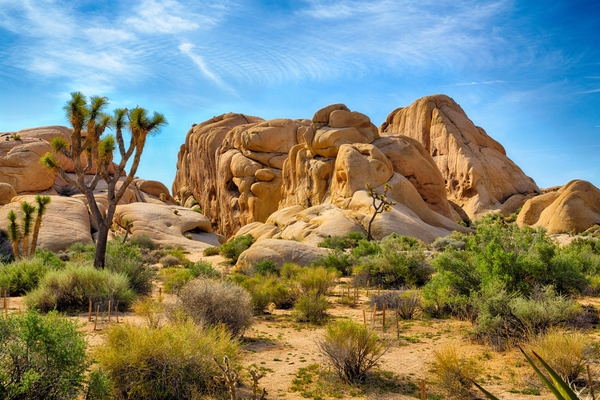Iconic Joshua Trees Are Disappearing Amid Climate Change
Scientists are predicting that Joshua Tree National Park could lose almost all of its Joshua tree habitat as climate change impacts more and more of the natural world.
A recent article published by National Geographic says the fate of the tree, an international symbol of the American desert, looks bleak amid rising global temperatures that are wreaking havoc on ecosystems and entire interspecies networks.
MORE Destination & Tourism
A new study cited by the article estimates that by 2100 California’s Joshua Tree National Park will have lost almost all of its Joshua tree habitat. The study is full of bad news when it comes to the future of the tree. It goes on to reveal that the tree has a symbiotic relationship with the yucca moth, a relationship that is essential to the tree’s survival.
The Joshua Tree relies on the moths to reproduce. But according to the study, these critical moths are not doing well in the few areas where the Joshua tree can survive the heat associated with global warming.
“We’re finding that not only does climate change affect species, it affects how species interact with each other,” Juniper Harrower, the study’s first author, and a graduate student at the University of California Santa Cruz, told National Geographic.
The impact of climate change on species interaction is a critical point.
As the National Geographic article points out: Joshua trees and the yucca moth depend on one another. If the yucca moths don’t survive in the colder parts of the park, Joshua trees won’t make it long either.
In other words – both species will disappear from the park.
According to the National Geographic article, climate change has already had an impact on this critical relationship.
“We don’t see any moths in the southern edge of the park,” Harrower told the publication. “Trees there no longer bear fruit, and some are beginning to die altogether.”
Unfortunately, in the high-altitude northern areas of the park, the story is equally discouraging. Not many moths have been found there and there are very few Joshua trees bearing flowers.
If the Joshua tree is lost, it will mean more than the disappearance of an important symbol of the American desert, Harrower said.
“All sorts of creatures interact with Joshua trees—insects, kangaroo mice, loggerhead shrikes. They create microhabitats by creating shade in the desert. Young trees germinate nearby. You have a reverberation through the entire ecosystem,” she said.
You may be interested

San Diego Comic-Con 2024: all the biggest trailers and news
admin - Jul 25, 2024[ad_1] With massive panels scheduled for both Thursday and Saturday, Marvel Studios seems ready to hype up its latest film…

Melania Trump releasing 'intimate' memoir
admin - Jul 25, 2024[ad_1] Melania Trump has a memoir coming out this autumn which her office describes as an "intimate portrait of a…

Wiz rejects Google’s $23 billion takeover in favor of IPO
admin - Jul 23, 2024[ad_1] Cybersecurity startup Wiz has turned down a $23 billion takeover bid from Google’s parent, Alphabet, breaking off what would…
Leave a Comment
You must be logged in to post a comment.





















